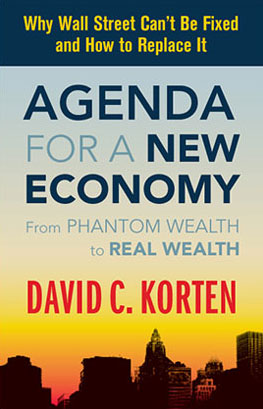
By Steven Chapman
“Korten argues that we must abandon our current narratives of Empire and domination, and embrace new narratives which would situate humanity in its proper ecological context, and allow for the co-evolution of human communities away from their current destructive pathologies and towards a new values-based self-understanding as part of the larger Earth Community.”
– Steven Chapman on David Korten’s book, Agenda for a New Economy: From Phantom Wealth to Real Wealth.
March 11, 2009
I first heard Dave Korten speak at the Open Center in SoHo in New York City about a dozen years ago. He had just published his now classic work When Corporations Rule the World, and I wanted to hear in person what he had to say. I remember him explaining how the takeover of the global economy by large trans-national corporations was one of the greatest power-grabs in history, and how, in his opinion, the stock market was simply a Ponzi scheme, bound to burst like any speculative bubble. How prophetic his words seem today, in light of the failure of neo-liberal economic policies and the global market meltdown!
Korten’s latest work, Agenda for a New Economy, is both a distillation of more than two decades of critical thinking, and a timely call for civil society to chart a different course into the future. It joins such recent works as Van Jones’ The Green Collar Economy, Bill McKibben’s Deep Economy and Riane Eisler’s The Real Wealth of Nations in providing a blueprint and a vision for what a truly sustainable economy might look like.
The book begins by emphasizing the distinction between “phantom wealth,” the paper wealth produced by Wall Street, and the “real wealth” of living economies. He contrasts the leading indicators of Wall Street, such as Gross Domestic Product and worker productivity, to real life indicators, such as the Happy Planet Index, or the collective values enunciated at the World Social Forum, or those enshrined in the Earth Charter.
After documenting the rise of the Limited Liability Corporation and its historical connection to Empire, Korten draws some interesting parallelisms between the earlier era of Gunboat Imperialism and the more recent emergence of Shock Capitalism. He aptly describes the off-shore hedge fund managers as the “buccaneers” of today’s market economy, while the major banks are described as the “privateers,” government-chartered marauders who inflect their damage in return for a percentage payback.
The second half of the book outlines an alternative vision of the future in which the values of Main Street, rather than Wall Street, prevail. In this vision, the economy is structured according to the essential priorities of human societies, including the right to food security, housing, education, means of livelihood, and a healthy environment.
The most inspiring moments of the book are found in the final chapter, “Change the Story; Change the Future,” where Korten argues that in order to achieve real change we will need to change the stories we tell about who we and where we want to go. Summarizing some of the material contained in his previous work, The Great Turning: From Empire to Earth Community (1996), Korten claims that our species has reached an epochal turning point, in which we will have to reinvent ourselves at the species level, both in terms of our relationships to each other, and in terms of our collective relationship to the larger life community on our shared planet. In order for either to survive, Korten believes that the antagonism between human culture and the natural world will have to be transformed into a symbiosis in which human systems emulate the self-organizational capacity of natural systems to evolve in a coordinated and mutually-beneficial manner. To do this, Korten argues that we must abandon our current narratives of Empire and domination, and embrace new narratives which would situate humanity in its proper ecological context, and allow for the co-evolution of human communities away from their current destructive pathologies and towards a new values-based self-understanding as part of the larger Earth Community.
What informs and motivates Korten’s work above all is a belief in the power of popular movements to change the stories that frame the collective life of society, and thereby engender new cultural and institutional realities. According to Korten, the great ethical imperative of today’s emerging civil society—which he likens to the early American patriots in their organized struggle against the British Empire—is to help bring about a powerful social movement, mobilized from below, which can be a catalyst for deep transformational change.
Even more than his critical analysis of the current economic situation, what I find most inspiring about Korten’s work is his ability to articulate in very concrete and understandable terms the common hope shared by so many who believe that a better world is possible.
Steven Chapman is a literary critic and eco-activist. He has written articles on Ecological Literary Theory, and on the poetry of Gary Snyder and Robinson Jeffers. He is the founding director of the Foundation for Ecology and Culture, a 501(c)3 dedicated to promoting ecological literacy since 1998. He is also active in many local environmental organizations, including Nature in the City, the Stewardship and Environmental Education Collaborative of San Francisco, and the Sierra Club, where he serves on the Executive Committee of the San Francisco Group.
More Info
To discover more about Korten’s work, visit his website at davidkorten.com.
For more related articles, check out the online edition of Yes Magazine at yesmagazine.org.


 The Hunger Site
The Hunger Site
No Comments
Comments for David Korten: “Agenda for a New Economy:
From Phantom Wealth to Real Wealth” are now closed.